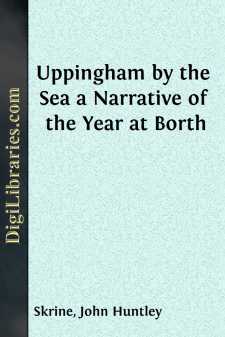Categories
- Antiques & Collectibles 13
- Architecture 36
- Art 48
- Bibles 22
- Biography & Autobiography 813
- Body, Mind & Spirit 142
- Business & Economics 28
- Children's Books 15
- Children's Fiction 12
- Computers 4
- Cooking 94
- Crafts & Hobbies 4
- Drama 346
- Education 46
- Family & Relationships 57
- Fiction 11829
- Games 19
- Gardening 17
- Health & Fitness 34
- History 1377
- House & Home 1
- Humor 147
- Juvenile Fiction 1873
- Juvenile Nonfiction 202
- Language Arts & Disciplines 88
- Law 16
- Literary Collections 686
- Literary Criticism 179
- Mathematics 13
- Medical 41
- Music 40
- Nature 179
- Non-Classifiable 1768
- Performing Arts 7
- Periodicals 1453
- Philosophy 64
- Photography 2
- Poetry 896
- Political Science 203
- Psychology 42
- Reference 154
- Religion 513
- Science 126
- Self-Help 84
- Social Science 81
- Sports & Recreation 34
- Study Aids 3
- Technology & Engineering 59
- Transportation 23
- Travel 463
- True Crime 29
Uppingham by the Sea a Narrative of the Year at Borth
Categories:
Description:
Excerpt
CHAPTER I.—EXILES, OLD AND NEW.
“O what have we ta’en?” said the fisher-prince,
“What have we ta’en this morning’s tide?
Get thee down to the wave, my carl,
And row me the net to the meadow’s-side.”
In he waded, the fisher-carl,
And “Here,” quoth he, “is a wondrous thing!
A cradle, prince, and a fair man-child,
Goodly to see as the son of a king!”
The fisher-prince he caught the word,
And “Hail,” he cried, “to the king to be!
Stranger he comes from the storm and the night;
But his fame shall wax, and his name be bright,
While the hills look down on the Cymry sea.”
Finding of Taliesin.
Elphin, son of Gwyddno, the prince who ruled the coasts between the Dovey and the Ystwith, came down on a May-day morning to his father’s fishing-weir. All that was taken that morning was to be Elphin’s, had Gwyddno said. Not a fish was taken that day; and Elphin, who was ever a luckless youth, would have gone home empty-handed, but that one of his men found, entangled in the poles of the weir, a coracle, and a fair child in it. This was none other than he who was to be the father of Cymry minstrelsy, and whom then and there his rescuers named Taliesin, which means Radiant Brow. His mother, Ceridwen, seeking to be rid of her infant, but loath to have the child’s blood on her head, had launched him in this sea proof cradle, to take the chance of wind and wave. The spot where he came to land bears at this day the name of Taliesin. On the hill-top above it men show the grave where the bard reposes and “glories in his namesake shore.”
* * * * *
There is something magnetic in a famous site: it attracts again a like history to the old stage. Thirteen centuries and a half after the finding of Taliesin, the same shore became once again an asylum for other outcasts, whose fortunes we propose to chronicle.
But since the day when they drifted to land the cradle of the bard, the waves have ebbed away from Gwyddno’s weir, and left a broad stretch of marsh and meadow between it and the present coast, where stands the fishing village of Borth. The village fringes the sea-line with half a mile of straggling cottages; but the eye is caught at once by a massive building of white stone, standing at the head of the long street, and forming a landmark in the plain. This building is the Cambrian Hotel, reared on a scale that would suggest the neighbourhood of a populous health-resort. But the melancholy silence which haunts its doors is rarely broken, between season and season, by the presence of guests, unless it be some chance sportsman in quest of marsh-fowl, or a land-agent in quest of rents.
When, therefore, on the 15th of March, 1876, a party of four visitors—the Rev. Edward Thring, Headmaster of Uppingham School, one of the Trustees of the school, and two of the masters—were seen mounting the steps of the porch, it was a sight to make the villagers wonder by what chance so many guests came to knock at the door in that dead season. Had the wind blown them hither? It blew a hurricane that day on the bleak coasts of Cardigan Bay; but it was a shrewder storm yet which had swept this windfall to the doors of Borth.
The story must be briefly told. On November 2nd, 1875, Uppingham School was dispersed on account of a fever which had attacked both town and school, not without fatal casualties. On January 28th, 1876, the school met again. In the interval the school-houses had been put in complete sanitary order, and though the efforts made to amend the general drainage of the town had been only on a small and tentative scale, it was thought that the school, if secure on its own premises, might safely be recalled, in spite of remaining deficiencies outside those limits. But, tua res agitur—the term began with three weeks of watchful quiet, and then the blow fell again. A boy sickened of the same fever; then, after an interval of suspense, two or three fresh cases made it clear that this was no accident. An inspection of the town drainage, ordered by the authorities, revealed certain permanent sources of danger. It was clear that the interests of school and town, in matters of hygiene as in others, were not separable; perhaps the best fruit of the sequel has been the mutual conviction that those interests are one....


